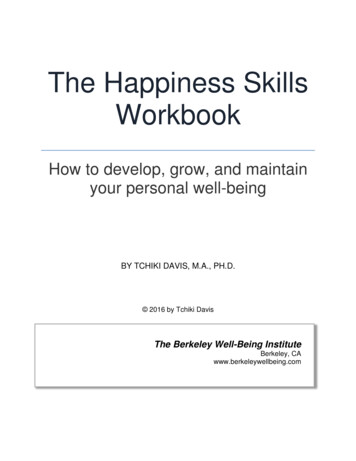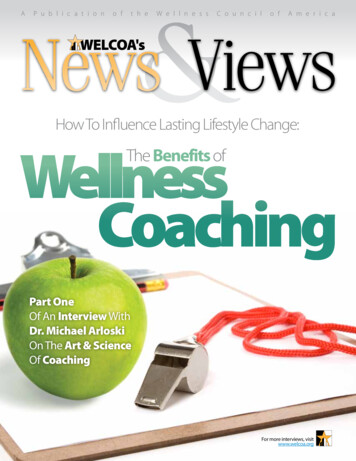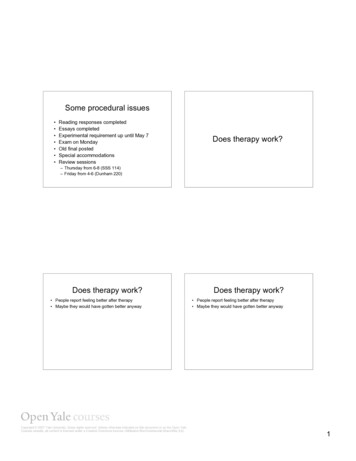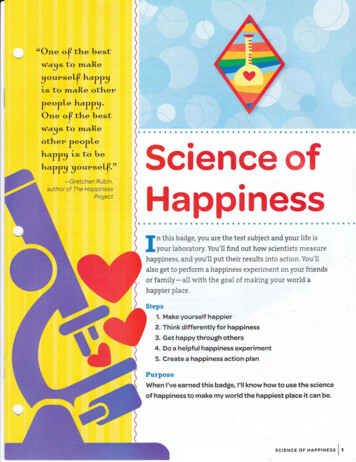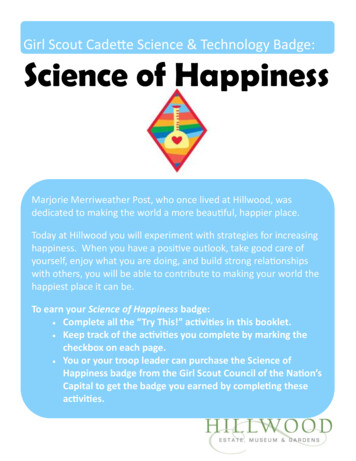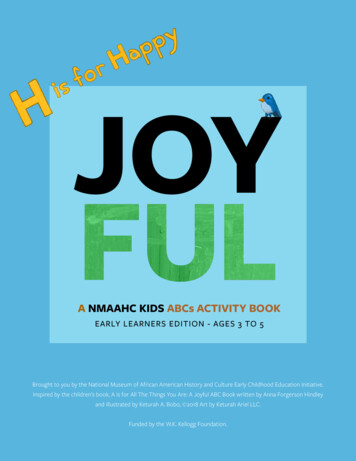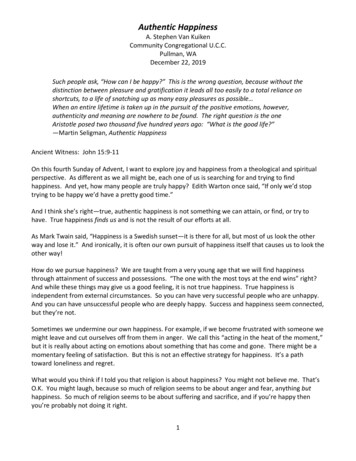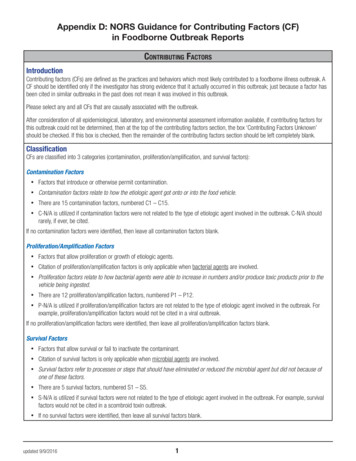
Transcription
GETMOREHAPPINESS & JOYINCREASING OUR JOY. rarer than happiness,and more life-transformingis moreHAPPINESS& JOYpossible.or shouldyou settle forwhat you have?UNBALANCEDHAPPINESSAND JOYCAN THE PURSUIT OF HAPPINESSDISTRACT US FROM JOY?CULTIVATINGHIGHER QUALITIESOF HAPPINESSWhen we learn theskills of life, we gainthe art of happinessJoy &HappinessHOW ARE THEYDIFFERENT?PRACTICAL PROCEDURES, SELF-AWARENESS EXERCISES, 360-DEGREE ASSESSMENTS ANDWALLET-CARD, WEEKLY MEASURES TO HELP YOU BOOST YOUR HAPPINESS AND JOY
is moreHAPPINESS& JOY possible?or should you settle for what you have?Recent advances inneuroscience have led to agreater understanding of howour brains function and newhope for those strugglingwith sadness. There areself-help tools, counselors,coaches and mentors whokeep gaining more skillsand knowledge and seeingtremendous healing in peoplewho are suffering. Today,achieving happiness and joyis possible for everyone, eventhose dealing with mentalillness. Sound too good tobe true? Judge for yourself.Take the first step to greaterjoy and happiness by readingthis news magazine andvisiting Your wellness portalto explore the many benefitsof increasing your overallhealth and well-being.
D o you wish you could tradeThe UnitedNationsfound thelink betweenhappiness,wellbeing andprosperity sostrong that itdeclared anInternationalDay ofHappiness.your life for another one?Or feel you got dealt a bad“hand” in life? If so, you’renot alone. Many of us wish formore money, a bigger house, anicer car, or kids who love usno matter what. We think theseare important, and they are.They’re the kind of things thatmake us happy – all based onexternal circumstances and allnormal and healthy desires tohave. But how much of yourenergy and time is invested inbeing happy and how much inexperiencing joy?J oy is internal and essentialto our well-being. It’s a choice– something we have totalcontrol over. A good exampleis someone going through difficult circumstances who’sable to handle them with easeand grace. They appear resilient, strong, even courageous.Where do they get such qualities? Maybe they’ve had joymodeled to them at an earlyage by their parents or closefriends. Or maybe, somewherealong their life’s path, theylearned how to be resourcefulin finding joy as well as coping with challenges. They feelthankful, peaceful and contented no matter what.T here is a powerful and innatedesire within each of us to feelhappiness and joy. Like waterand air, we need them both.And if we don’t get enough,we can become susceptible tovarious forms of mental illnessor compensate by developingunhealthy addictions.T hechallenge being givento all employees and familymembers is to increase yourlevels of joy and happiness.If you’re fortunate enoughto have ample amounts ofhappiness and joy in your life,we encourage you to lead asmall group of people and toconnect with those who arestruggling.S tudiesshow the brain isneuroplastic; in other words,it can be re-shaped, just aswe can re-shape our physicalbodies when we head to thegym. With the help and supportof others, we can changethe way we feel without ourcircumstances changing. It’sdefinitely a higher road thatrequires a particular mindsetand skill set.T he question is, are you upfor the challenge? It startswith you taking the first step,reaching out, and believing youcan. And it may turn out to beone of the greatest adventuresyou will ever take.3.
JoyandHAPPINESShow are they different?T he similarities between joy and happiness B ecoming a student of how to bring moreoften lead us to view them as the same – butthey aren’t. In order to increase both in your life,it’s necessary to understand how they differ.Often the attitude we take towards joy orhappiness is that they “just kinda happen” andwe don’t really have much control over theamount we have. It’s possible that you mightremember a time when you seemed to havegreater control over the levels of happinessand joy you experienced. There were certainthings you did that would increase them – but,for some reason, it’s no longer that way today.Change the way you look at thingsand the things you look at change.Wayne Dyerjoy and happiness into your life is a consciouschoice. It is possible, regardless of your lifecircumstances and situation, if you train yourselfhow to do it. The first step is in understandingwhat the differences are between happinessand joy. Happiness most often comes fromexternal circumstances and things. Joy tendsto come from within us. They are equallyimportant – but different.F indthat place where you feel mostcontemplative. When you reach a contemplativestate of mind, slowly read each of the statementsabout happiness and joy in the table on the nextpage. Reflect on how each affects you. Try todiscern the differences between happiness andjoy as they apply to your life.
HAPPINESSexternalHOW THEY DIFFERJOYinternal Happiness is an unexpected Joy is feeling love Happiness comes from Joy comes from discoveringcall from a good friend.discovering new thingswhile on holidays.for someone.something new that youlike about yourself. Happiness is a day when Joy is success in not Happiness is getting a Joy comes from being Happiness is a glass of Joy is being conscious that Happiness is being validated Joy comes from teaching Happiness is when someone Joy is when you sense Happiness is irregular: Joy comes and goes, butthings are going really well.promotion at work.fine ice wine paired withthe perfect dessert.for something good you did.expresses their love forand acceptance of you.it comes and goes.allowing a hard day to dragyou down or letting yourthoughts become extreme.thankful for your work.you have access to foodand water, all the time.yourself how to validateyourself for who you areand not what you do.the love and acceptanceyou have for yourself.it's always a choice.HOW VANCECREATED MOREHAPPINESS ANDJOY IN HIS LIFE.Vance is a managerwho has learned thatnothing in life isfree and if you wantsomething, you needto go after it. Ahighly motivated guy,he considers himselfa happy person. Recently, though, Vancewent through a relationship breakup andhis levels of happiness plummeted. Afew sessions withhis EAP counselorhelped him cometo the realizationthat he was a happiness junkie. As aresult, Vance createda goal to cultivatemore joy in his lifeand to increase thequality of happinesshe experiences.Generally speaking, people in developing countrieshave less happiness and more joy. For people indeveloped nations the opposite is true. The reasonfor this is because opportunities for happiness areall around us and we tend to overdose on them,leaving very little energy and time to develop theskills to obtain greater levels of joy.5.
FINDING BALANCE IN THE PURSUIT OFHAPPINESS & JOYEach of us has limited timeand energy each day. How we investthis energy determines what we get. Ifwe put most of our energy into pursuing happiness-focused things, we mayend up with lower levels of joy. Thoughhappiness is essential to our wellbeing, it’s not enough. We also needjoy. If you go through a difficult seasonin your life and the amount of happiness you experience declines, joy, being more constant, will be there for youto draw upon in your time of need.Consider the efforts you put into thepursuit of happiness and joy in your lifeby answering these questions. In addition, ask a friend who knows you wellto also answer them on your behalf.This will give you new and valuable insights into your own happiness and joy.COMPLETEDBY MYSELF1. Using the Joy and Happiness list on page 5, howmuch of your time and energy do you spend in a week pursuing happiness-focused things? How much time and energy do you spend pursuing joy-producing activities? Usea % to measure the ratio between the two and then take amoment to journal your thoughts concerning this question.2. Was there a time in your life when you had a goodbalance of both happiness and joy? If so, what was it like?3. Reflect back and consider if there was a time when,due to your circumstances being difficult, your happinesslevels were low. Were you able to tap into your reserves ofjoy to get you through? Briefly write about this experience.The natural tendency for most of us is to pursuehappiness more than joy, for the simple reasonthat happiness is often easier to attain. Cultivatingmore joy in your life is a process that requiresa retraining of your thoughts and emotionalpatterns. If a person has never had the opportunityto train themselves or be counseled in changinghow they think and feel, it is possible to getcaught up in unhealthy thoughts and emotionsthat produce very little happiness and joy.
COMPLETED BY SOMEONEWHO KNOWS ME WELL1. Using the Joy and Happiness list on page 5, how much oftheir time and energy does this person spend in a week pursuing happiness-focused things? How much time and energy do they spend pursuing joy-producing activities? Use a% to measure the ratio between the two and then take a moment to journal your thoughts concerning this question.2. Was there a time in their life when they had a good balance of both happiness and joy? If so, what was it like?3. Reflect back and consider if there was a time when, dueto their circumstances being difficult, their happiness levels were low. Were they able to tap into their reserves of joyto get them through? Briefly write about this experience.Joy does not simply happen tous. We have to choose joy andkeep choosing it every day.Henri NouwenHOW KATECREATED MOREHAPPINESS ANDJOY IN HER LIFE.Kate is a singlemother of two whoworks full-time.During one particularly difficult period,it seemed like therewas no happinessin her life. Her dayswere consumed withwork, kids’ stuff,and keeping thehouse going. Everynight after the kidswere in bed, Katefelt exhausted andoften struggled tosleep because ofstress. One day, sherealized she wasputting all her timeand energy towardseveryone else anddoing nothing forherself. She decidedto make a pact withherself to deliberately do somethingeach day that wouldbring her happiness or joy. It tooktime, but Kate didsucceed in increasing the happinessand joy in her life.7.
CULTIVATINGHIGHERQUALITIES OFHAPPINESS.by way of self-control and learned skills7 Ways To Be Happier:DO SOMETHING YOU REALLY ENJOY EVERY DAYIt doesn’t need to be fancy or expensive. A bag lunch with afriend. A free concert or movie in the park. A new piece of clothing or furniture from a thrift or consignment store. A walk in thecountry. A table game. A one-day vacation close to home. Whatdo you really enjoy? What would you enjoy doing today?01KNOW WHO YOU ARE ANDWHAT YOU WANTWhen we have clarity about who we are andwhat we want, we are better prepared for experiences and relationships that fulfill us. Ofcourse, we often learn who we are and whatwe want through experience. Know what you’regood at. Be clear on your boundaries. If youwake up feeling yucky, don’t do that again.02CHOOSE ACTIVITIES AND PEOPLE WHOMAKE MORE OF YOU, NOT LESSThe way to grow is not simply by eliminating destructive pleasures,but also by embracing the happiness that builds us and others up.Connect with others in ways that are meaningful, productive and intimate.It is not howmuch we have,but how much weenjoy, that makeshappiness.Charles Spurgeon03
BE THANKFUL04Be thankful for every experience you enjoy. Beyond that, choose things you can enjoy evenwhen you are not thinking about them. Whenyou choose a good bed, your body is grateful every night. When you work and are paid,every time you spend money is an opportunity for thankfulness. When we live with gratitude, we see more in life to be thankful for.RELAX – DON’T OVERTHINK IT05Enjoy the good things in life without thinking aboutit too much. Food isn’t delicious because we thinkabout it and adjust our attitude. And don’t worryabout pleasing everyone if you want to be happy.After the Dalai Lama had spoken for more than anhour to a stadium full of people about finding happiness, he looked up, smiled, and concluded: “Andif you don’t like what I’m saying I don’t care.” Enjoy what is good while choosing what is better.ADJUST THE PACE OF YOUR PLEASURES06If you must always outdo yourself, eventually youwill wear yourself out. An overstimulated psychecontinues to raise the quota for happiness. Thiscan come from a sense of inadequacy or wanting what others have instead of getting in touch withwhat you want. Instead of looking only for the happiness excitement brings, enjoy the happiness ofsatisfaction too. What excites and satisfies you?GROW07Raise your self-confidence by learning new skills.What would you like to do, or do better? Raiseyour self-esteem by listing things you appreciateabout yourself and stopping negative self-talk.Strengthen your self-concept or sense of identity bylearning from your experiences, even bad ones.HOW JESSACREATED MOREHAPPINESS ANDJOY IN HER LIFE.Jessa is a young,married professionalwho considers herselfjoyful. When askedhow and where shelearned to be joyful,she couldn’t quiteexplain it but attributed it to somethingshe learned as a childwhen her family immigrated from India toCanada. When askedif she was happy,however, Jessa realized that she wasn’tas happy as she’d likeand wanted to elevateher happiness levels.She accomplishedthis by learning to increase her self-value,which allowed her tonot be so frugal andto spend money onherself. Bringing morehappiness into herlife was a long process, but today shefeels she has a goodbalance betweenjoy and happiness.AN OVERSTIMULATED PSYCHE IS HARD TO PLEASEWe cannot be happy if we expect to live all the time atthe highest peak of intensity. Happiness is not a matter ofintensity but of balance and order and rhythm and harmony.Thomas Merton9.
INCREASING OUR JOY. rarer than happiness, and more life-transforming8 Qualities of Joy1. ContentmentChoose contentment. Worryor greed breeds discontentment, which can rob you of joy.Worry is always about whatmight happen, while peoplewho have more than what theyneed are no happier than thosewho have just what they need.Choose to change the focusof your thoughts and to enjoywhat you have at this moment.2. HopeHope is more than optimism. Itis an approach to life that canbe learned. Hopeful people:where they Envisionwant to be.out the steps Layto get there.their willpower to Applytaking the steps of hope.3. GratitudeThinking about what we’rethankful for gives us the ability to see the good in life.An overstimulatedpsyche is hard to pleaseWe think too much aboutwhat goes wrong andnot enough about whatgoes right in our lives.This focus on negativeevents sets us up foranxiety and depression.One way to keep this fromhappening is to get better at thinking about andsavoring what went well.Dr. Martin Seligman,University of PennsylvaniaBy living this way, we put thepowerful emotions of hopewithin reach of our own actions.When you are feeling a lack of happiness andjoy, carry out this thankfulness exercise: List ona piece of paper 20 things you’re thankful for. Atthe end of the exercise, see if the state of yourhappiness and joy has increased.4. PeaceIt’s normal to be aroused to fearor anger in a stressful situationor when we’re attacked. Whilewe cannot control the attitudesor actions of others towards us,we can regulate our responseand, with practice, learn to moveour psychological state to amore peaceful one with activitieslike deep breathing exercises.An uncluttered Simplify:lifestyle fosters peace.Forgive the fail Relinquish:ures of others and yourself.Spend some Solitude:quiet time alone.Give your Wholeheartedness:self entirely to all that you do.There is only one way to happiness and that is to cease worrying about things which arebeyond the power of our will.Epictetus, first-century slave,philosopher and teacher
Joy is found in the mastering of life. This is verydifferent from controlling the world around us. Joyinvolves what is most important. It is born from ourinner qualities, not external circumstances.5. InspirationSeek out things that renew yoursense of awe. What fills you withinspiration? A starry night? Mountains or the ocean? Gifted peopleor great music? Don’t wait forinspiration to come to you. Findand experience it for yourself,and take someone along withyou from time to time. Inspiration is like breathing: it’s bestwhen we do it for ourselves.6. SufferingSuffering seems like an odd way toachieve joy, but suffering actuallydeepens our capacity for feeling.It gives us more emotional spacein life and teaches us how to appreciate what we have. There arejoys that we will never truly understand, except after experiencingloss. Don’t seek out suffering, butaccept it as a path of growth.7. RelationshipsGreat relationships multiply joy.When you find friends whosecompany makes every experience better, keep them. Evena bad experience is better withgood people. If you need that kindof person in your life, don’t wait:take the initiative and find one.8. SpiritualityFaith connects us to our deepestself, to the people and world aroundus, and to the Divine. In manytraditions, the practices of meditation or prayer are paths to joy.We are shaped by our thoughts;we become what we think. Whenthe mind is pure, joy follows likea shadow that never leaves.BuddhaHOW DONCREATED MOREHAPPINESSAND JOY INHIS LIFE.Don considers himself a functioning addict. He quit drinking10 years ago but isaddicted to videogames and food andneeds to take medsfor anxiety. Whenchallenged with theresults, Don decidedthat it was time tomake changes in hislife. He started seeing his EAP counselor over a 10-monthperiod during whichhe began to seeimprovements.When asked what itwas that made thebiggest difference,he replied that itwas sticking with acounseling programand not giving up.His perseveranceenabled Don to findmore joy by increasing his contentment and feelingsof thankfulness.11.
AWARENESSEXERCISEThe first step to increase yourlevels of happiness and joyis to learn what they are andto be aware of their presenceor absence in your lifeHAPPINESSRANK YOURSELF 1-10as to how true this statement is for you(10 being the highest and 1 the lowest).I am aware of the energy I put towardschasing things that focus on happiness.I have a good balance betweenhappiness and joy.I have a sufficient amount of happiness in my life.I am content with the quality of happiness I pursue.I am learning new skills on findinghigher qualities of happiness.JOYRANK YOURSELF 1-10as to how true this statement is for you (10being the highest and 1 the lowest).I am aware of the energy I put towardsfinding joy in my life.I make sure I conserve some energyto cultivate joy in my life.I have a sufficient amount of joy in my life.I feel my skills in cultivating morejoy in my life are improving.When I experience joy, my need for high-intensity/unhealthy-type happiness is not as strong.
by going after higherquality happinessand joy activities.Find a balance Do something you really enjoy every day. Know who you areand what you want. Choose activities andpeople who makemore of you, not less. Be thankful. Relax – don’toverthink it. Adjust the pace ofyour pleasures. Grow.Finding More HappinessIn the developedworld, our overstimulated psyches are aresult of spending toomuch time seekinglow-quality happiness.WALLET CARD TO EVALUATEHAPPINESS & JOY LEVELSs neuroscientistsdiscover moreabout how our brainfunctions, their findings are enablingpeople to learn tocreate more joy andhappiness in theirlives. Work to improveyour joy and happi-AHAPPINESSAND JOYFind a friend, sibling or people fromwork who will meetweekly for lunch todiscuss the contentsof this wallet card andagree to challengeeach other towardsincreasing happiness and joy levels.your wallet. It will remind you to review itscontents and measureyourself twice a week.Making changes inCut, fold andcarry this card in#ness levels using themethods we suggest.For some people, thismay take help fromyour EAP provider,but the investmentis worth it – becauseyou’re worth it !Learn to cultivate anddevelop within yourself: Contentment Hope Gratitude Finding more peace Cultivating deeper,engaging relationshipsGetting More Joyare different,The similarities between joy and happiness can cause usto view them as thesame – but theyyour psychology toincrease your levelsof happiness and joyhappens incrementally, and measuring your progresswill motivate you.Measure yourselftwice a week andwatch your levels ofhappiness and joyincrease. Rememberto be patient withyour brain: changeoccurs incrementally. Too many peoplegive up on personalgoals because theywant instant results.comes more fromexternal sources andJOY tends to comefrom internal sources.HAPPINESSand to increasethem in your life, it’simportant to learnhow they differ.
kewekewekewekewekWhen I experiencejoy, my need for highintensity/unhealthytype happiness isnot as strong.MeweI feel my skills incultivating more joy inmy life are improving.FkI have a sufficientamount of joy in my life.MeweI make sure I conservesome energy to cultivatejoy in my life.FkI am aware of theenergy I put towardsfinding joy in my life.JOYMeweI am learning newskills on finding higherqualities of happiness.MkI am content withthe quality ofhappiness I pursue.FeweI have a sufficientamount of happinessin my life.MkI have a goodbalance betweenhappiness and joy.FRank yourself Monday and Friday from 1 to 10 (10 highest).eweI am aware of theenergy I put towardschasing things thatfocus on happiness.HAPPINESSMRank yourself Monday and Friday from 1 to 10 (10 highest).Cut and fold the wallet card on the dotted lines. Fold it into the size of a credit cardand carry it with you in your wallet. Measure yourself every Monday and Friday.COMPLETE YOUR WALLET CARD:Log in to your wellness portal for more resources on happiness and joy.8765432187654321
CONTENTMENTThe foundation for happiness and joyWhen you wake in the morning or when you drift away at night, areyou content? When life is quiet and your mind is relaxed, there is achance to feel and ask: “What do I truly want?” For clues to whatyou are pursuing, look at how you spend your time and money. Whereare you spending your energy? Is it producing contentment?A. Things that hindercontentment1. Unmet expectationscreate discontentmentCan you have too muchhappiness? Part of the answer isnot in how much you have, but inhow much you want. A man in asmall village in Burkina Faso wholives in a one-room hut is happyto have a home with a raised bed.Another man living in an apartmentfive times larger is unhappybecause there is not enough light.If you don’t have what you want, orworse, if you have what you don’twant, you may be discontent.Choosing to accept what wehave leads our emotions tocontentment.2. Chasing pleasure dis-tracts us from contentmentPhilosophers and scientists callthis the Pleasure Paradox: themore you pursue pleasure, the lesslikely you are to experience it.The pleasure centre of the brainhas a set point and the morewe pursue pleasure the more ittakes to create the same levels ofpleasure. Eventually, the pursuitof pleasure exhausts and enslavesus. It’s like a person who eats tofeel better after being hurt, butkeeps on eating even after thepain is gone. Or like a person whoscratches a rash; the discomfortonly spreads and gets worse.When we keep pursuing things thatprovide less and less enjoyment,we are moving away fromcontentment.To quote a recovering addict, “Youhit bottom when you stop digging.”B. Things that nourishcontentment:1. Gratitude introducesus to contentmentIt is not contentment that makes usgrateful. It is gratitude that makesus content. When unhappinessand discouragement are swirling inyour life, start counting what you’rethankful for.If you’re experiencing sickness,trouble at work, or relationshipproblems, ask yourself: Whatare three things I am gratefulfor? It won’t be the end of yourtroubles, but it may serve as a newbeginning.2. Enjoy simple pleasuresEnjoy the good moments withoutregret for the past or worry for thefuture.One day, a tourist was sitting ona stone terrace overlooking theMediterranean and took a bite ofa burger. “This may be the bestburger I have ever tasted,” heremarked. His host looked at himand said “Somewhere, sometime,something has to be the best. Whynot let it be now?”Live in the here and now, to live incontentment.3. Own your lifeTake responsibility for your ownactions and emotions. When weown our part we can accept whathas happened. If we don’t, it ishard to believe that what we domakes any difference. It does, evenif it doesn’t make all the difference.4. Accept what youhave no control overA relative or a co-worker thatpresses every button. A bad driverthat runs a red light. A global financialcrisis. Don’t let things beyond yourcontrol, control your psychologicalstate.5. Believe that life is bringing what you needHope is not the assurance that you willget what you want, but that you will beokay no matter what life brings. Thatinner assurance creates contentment.If you’re here now, you’ve made itthrough everything so far.15.
Log in to your wellness portal for these and moreresources on joy and happiness.Wellness FilesWellness FilesFall 2013Spring 2013InterpersonalRELATiONSHIPS.just why do they matter so much to our mental health?YOURRelationshipsdeterminethe qualityof lifePSYCHOLOGYRelationshipsARE CRITICAL IN OUR LIVES .BUTHOW CAN WE IMPROVE THEM?.what is it and can you change it?HEALTHYCANPEOPLEPSYCHOLOGYCHANGE?vs. UNHEALTHYPSYCHOLOGYHOW TO ENHANCEYOURYOUR RELATIONSHIP SKILLSPSYCHOLOGICALHEALTHRelationshipFracturesThe greatest predictivefactor to holistic successAND YOUIMPROVEYOUR PSYCHOLOGYUSING 6 INITIATIVESFOOD’S EFFECTImproveyourpsychology.ON YOUR MOODHealthy psychologyis defined as howyou manage yourthoughts, emotionsand desires. Withoutit, you may struggleto find the level ofhappiness and joythat you deserve andrequire in your life.Take time to readthis past issue of“Your Psychology”found under yourdashboard menuitem “WellnessMagazines”on your wellnessportal.Buildingup stressresilienceallows you to getthrough a stressfulsituation with lessimpact. Reduceyour stress bycompleting thefour modules inthe Reduce StressWorkshop foundon the homepageof your wellnessportal under“ReduceStressWorkshop.”The EarlyYearsPOSITIVELY OR NEGATIVELYAFFECT OUR CAPACITY FORHEALTHY RELATIONSHIPSMIXING FOODand relationshipsan ancient practice thatwe still need todayReducerelationshipfractures.Much of the joyand happiness weexperience comesfrom relationshipsand when fracturesoccur they can robus of the levels werequire. Take time toread this past issueof “InterpersonalRelationships”under yourdashboard menuitem “WellnessMagazines”on your wellnessportal.HowHealthyis YourHome?Where you retreatto each night iscritical to your joyand happiness.Take this selfevaluation todetermine thesocial, emotionaland physicalhealth of yourhome, found under“Wellnessat Home”on your wellnessportal.Emotionalintelligenceis defined as beingaware of youremotions, learninghow to manage themand being empatheticand aware of theemotions of others.It plays a key rolein your ability toachieve happinessand joy. Take theemotional healthassessment foundunder “22 HealthAssessments”and “AccessMentalHealth.”Written and produced by: Vic LeBouthillier, Gregory Schroeder, M.S.W., Karl A. Peuser, PhD.Editor: Sabitri GhoshArt Director: Karen ChristensenFor comments or questions about this news magazine, email clientcare@gethealthonline.com
happiness & joy. increasing our joy. rarer than happiness, and more life-transforming. practical procedures, self-awareness exercises, 360-degree assessments and wallet-card, weekly measures to help you boost your happiness and joy. unbalanced. happiness. and joy. can the pursuit of happiness . distract us fr

